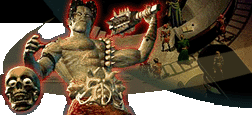Story
Below is how you beginning the game, how you create your character and how they story develops through dialog.
The Awakening
You awaken, frigid and confused. Scanning the room, all you see are stone tables like the one you are lying on and a sign, a sign that reads "The Mortuary". You aren't dead so why are you here and, more importantly, who are you? Your thoughts are interrupted when a floating skull approaches you and starts talking! Morte informs you that you had just died again. What does he mean, again?
In Planescape: Torment, you take on the role of the Nameless One, an immortal human who can't remember his identity. After awakening in the Dustman's headquarters, you must piece together who you are as you explore the bizarre world around you. The city of Sigil is inhabited by many strange folk and has gateways to even stranger worlds, all potential sources for information about yourself. As Chris Avellone (Lead Designer) put it:
There is money, but who you know and what you know is the currency that really moves things along in the game. Some people will really open up if you drop some names or fill them in on some of the darks in Sigil.
Nameless Creation
Character creation in Planescape: Torment is simple. You are the Nameless One, a human, male, 3rd-level fighter that regenerates and suffers from immortality. You begin a score of 9 in all your abilities: strength, intelligence, wisdom, constitution, dexterity, and charisma. You are then provided with 21 additional points to spread among the abilities as you choose. You are now done and ready to play.
Although you start as a fighter, prior to your most recent death, you had skills as a fighter, thief and mage. As you gain experience, these skills will come back to you. By finding trainers, you will be able to switch your class between fighter, mage and thief, but you are only one class at any given time. Much of the game depends on which class you are, making class-switching an important decision for your character's development and the story that is experienced. You begin with proficiency in "Fist" and "Edged Weapons", but no equipment of any sort.
You begin the game with True Neutral alignment. As the game progresses, your alignment will shift to reflect your actions. Being an evil character is a viable option, although butchering everyone you meet, might cause you to miss some vital information or get you mazed. Often combat isn't the only solution to your dilemma, however, sometimes conflict in unavoidable.
Greg Peterson (Marketing Head) described character development as:
It is about role-playing. Everyone starts with the same 'blank slate' and you create your character by playing him. You won't know everything you can do or can't do until you try. Some times you will be successful, sometimes not, and sometimes it will open a whole new area of abilities. There will be surprises around every corner - do not expect a stereotypical experience.
Dialog
The dialog in Planescape: Torment is more complex than it was in Baldur's Gate. There may be up to eight responses at a time, a few of which may achieve the same results but through different methods, for instance, "Thank you for your time, I know how busy you are." and "That's enough. I don't need any more information from you!" Some of the responses may also be actions that you can perform such as examining a person or taking apart a skeleton. The choices you make during conversations will affect your alignment. Many of the choices are not black or white, but shades of gray. The choices you are given can be influenced by what you have done in the game, who you have talked to, what you have said to others, your stats, your reputation, who is with you and where you have been. Dialog approaches the complexity of that in Fallout 2. Apparently, it is even possible to talk a few characters out of or into existence.
Eric Campanella (Artist) pointed out the importance of talking with your party members:
There is also another form of interaction that was surprising to me. The amount of discussion you can have with fellow party members, while they're in your party! You can talk to Annah about her friends, her past, her skills. You can talk to Fall-From-Grace about how she Feels about other party members, including you, how she thinks they feel about her, how you feel about her, etc.! You can have members teach you skills! Talk about they're own special talents! Even gain experience from this knowledge! And this information changes throughout the game! These people really feel alive! To add one more level to that, people that you meet will acknowledge different party members, sometimes ignoring you in favor of them. Talk to a githzerai townsperson. Doesn't say much. Now, talk to him/her with Dak'kon in your party. If you can get a word in between them, you might get some valuable information!
Dialog is handled like in Baldur's Gate, but there are no close-ups. A dialog box will pop up on the game screen when you are involved in a conversation. The dialog trees are often deep. Voice-overs are basically the same as Baldur's Gate, where the first line upon meeting someone is spoken. There is also floater text which appears if non-player characters utter simple phrases, when you examine objects or when the game is providing feedback, such as how much damage you have taken or your journal has been updated.
|

